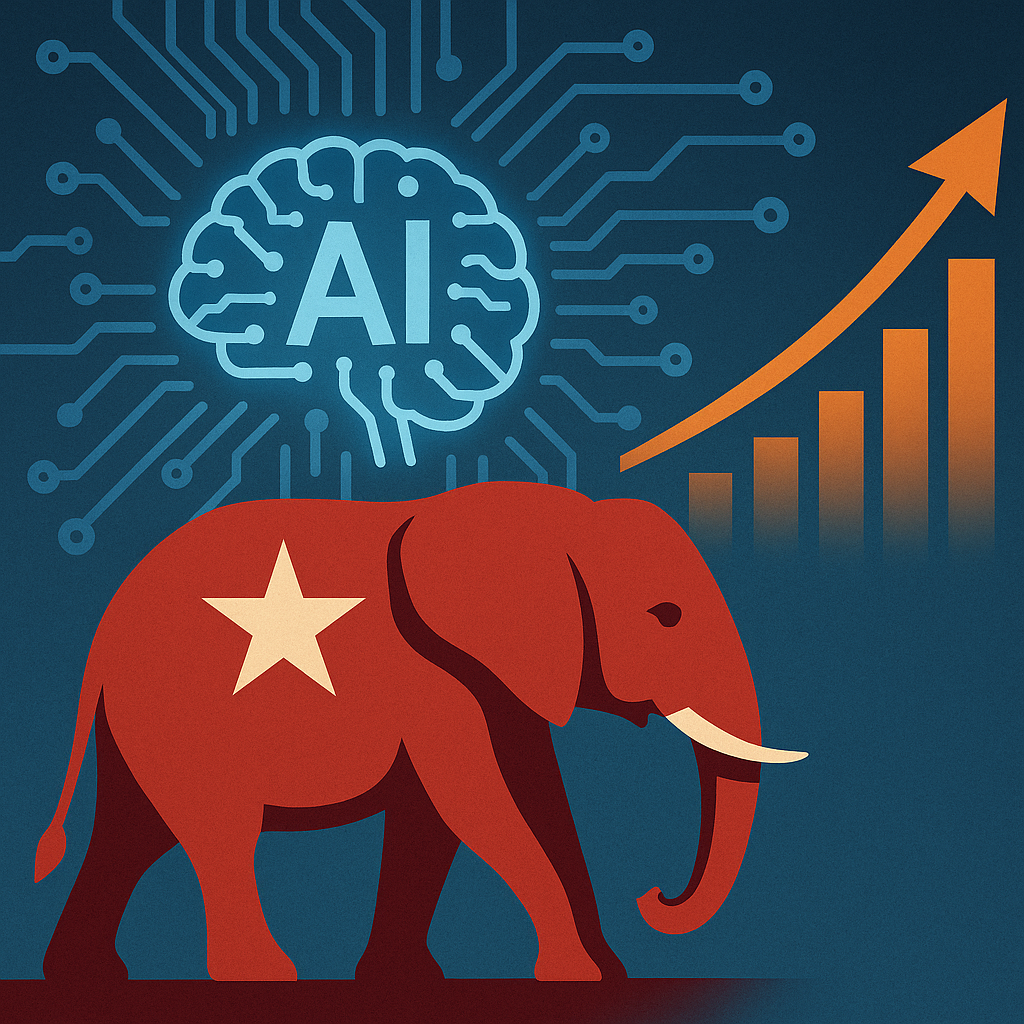As investors search for clarity in the rapidly evolving AI landscape, a seismic policy shift from Washington just lit up the tech sector. On Tuesday, the Trump 2025 campaign released a sweeping 28-page “American AI Initiative” that pledges to aggressively promote U.S. dominance in artificial intelligence through deregulation, export promotion, and opposition to so-called “woke” restrictions.
The announcement immediately rippled across equity markets, with major AI-linked companies like Palantir Technologies ($PLTR), C3.ai ($AI), and Nvidia ($NVDA) notching gains in early trading Wednesday. The Nasdaq Composite edged up 1.2%, powered in part by investor enthusiasm over lighter regulation and a clearer federal stance on AI innovation.
But while the market reaction was bullish, analysts are urging caution: the plan notably sidesteps growing concerns around AI misinformation, copyright enforcement, and data integrity.
Deregulation Meets Political Calculus
The Republican campaign’s plan includes several key proposals:
- Rolling back Biden-era AI safety directives
- Prioritizing “freedom-based” innovation over ethics-driven AI constraints
- Expanding global AI exports, particularly in military and defense tech
- Reviewing and dismantling “politically motivated” ESG and DEI mandates in AI companies
“The GOP is signaling that AI development should be treated more like the early internet—fast-moving and under-regulated,” said Maya Larsen, senior analyst at Forrester Research, in an interview with Reuters. “This will encourage short-term capital inflows into AI startups and infrastructure providers.”
In fact, since the announcement, the Global X Robotics & Artificial Intelligence ETF ($BOTZ) rose over 2%, while chipmakers like AMD ($AMD) and Supermicro ($SMCI) posted outsized gains amid expectations of increased demand.
Why This Matters for Investors
AI is expected to contribute $15.7 trillion to the global economy by 2030, according to PwC. With the U.S. locked in a technological arms race with China, government policy around AI regulation, R&D incentives, and export control can shift valuations overnight.
By pledging to strip down regulatory hurdles, the GOP plan could supercharge private investment and fast-track monetization of AI products across healthcare, defense, finance, and logistics.
But the plan’s lack of provisions for AI misinformation, deepfakes, or copyright protection also raises red flags. Without safeguards, AI platforms risk being entangled in lawsuits, user backlash, or government probes — especially in media, education, and intellectual property-heavy sectors.
“The market likes the growth angle, but the absence of regulatory frameworks could eventually hurt investor confidence,” noted Jenny Huang, managing partner at AccelEdge Capital.
Future Trends to Watch
- AI Infrastructure Demand Will Accelerate
Deregulation means less red tape for chip manufacturing and large language model (LLM) deployments. Watch for outsized gains in cloud service providers (AWS, Azure), GPU suppliers ($NVDA, $AMD), and data center REITs. - Defense and Surveillance Tech Stand to Benefit
With the plan emphasizing global export competitiveness, defense-aligned AI firms like Palantir ($PLTR) and Anduril could secure lucrative contracts both domestically and abroad. - Content & Copyright Litigation Risks May Rise
Companies in generative AI (e.g., OpenAI-partnered $MSFT or Adobe’s Firefly) could face mounting copyright disputes if no federal guidelines are introduced — a risk that could pressure stock multiples. - China Tech Tensions Could Escalate
The export-friendly posture is likely to intensify friction with China, especially if AI tech is tied to military or surveillance tools. Investors should monitor potential retaliatory trade actions.
Key Investment Insight
Investors should view this GOP AI action plan as a bullish near-term catalyst for U.S. tech and infrastructure stocks with heavy AI exposure. However, position sizing and sector diversification remain critical: firms exposed to content creation, user data, or international regulatory risk may face volatility as the regulatory vacuum persists.
Look to dollar-cost average into well-capitalized, infrastructure-focused names, and be ready to rebalance as policy clarity (or chaos) unfolds closer to the November 2025 election.
As U.S. political leaders shape the next phase of the AI economy, investors must stay nimble and informed. Whether this policy pivot accelerates a U.S. AI supercycle or invites unintended regulatory backlash, the stakes for capital deployment in the sector have never been higher.
Stay plugged in with MoneyNews.Today for daily investor insights, AI market intelligence, and political policy coverage that moves markets.





